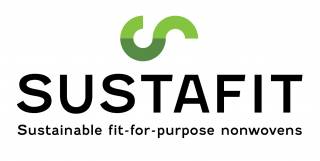The blog text is originally published in TAMK International blog on 13 September 2023: Unlocking Sustainability: The Power of Engineered Fabrics in Nonwovens Industry
When we think of fabrics, woven and knit textiles often come to mind. But, in the world of ‘Engineered fabrics,’ we encounter a realm that defies conventional norms. Engineered fabrics break free from traditional weaving or knitting; instead, they emerge through a dynamic interplay of fibers, technology, and creativity. This is precisely what we’re pursuing in the SUSTAFIT research project, aiming to identify sustainable solutions in the nonwovens industry, with a focus on engineered fabrics.
What are engineered fabrics?
Engineered fabrics are more than just textiles – they’re the embodiment of science meeting innovation. These fabrics are meticulously designed, tailored for specific applications, and infused with a spectrum of attributes. Whether it’s lightweight materials that resist wear, or robust fabrics that brave extreme conditions, engineered fabrics offer a tailored solution for every need.
The beauty of engineered fabrics lies in their boundless potential. Leveraging advanced raw materials, unique formation techniques, and innovative bonding methods, these fabrics can be tailored to deliver high-performance results. From the medical industry, where they’ve revolutionized protective gear, to the hygiene sector, where they enhance comfort and durability, the impact of engineered fabrics spans across diverse sectors.
Embracing the business potential of the engineered fabrics
Embracing engineered fabrics isn’t just a leap in innovation; it’s a stride towards sustainable solutions and ground-breaking possibilities. As businesses recognize the potential of these fabrics, they’re turning to them for eco-friendly alternatives, functional enhancements, and bold creations that push the boundaries of imagination.
The journey of engineered fabrics is an unfolding story of innovation, creativity, and limitless potential. From transforming healthcare to redefining fashion, these fabrics are at the forefront of progress. It’s time for businesses to step into this world of possibilities, embracing engineered fabrics to elevate their products, empower their innovations, and shape a brighter, more sustainable future.
In SUSTAFIT, besides exploring engineered fabrics, we investigate value chains, business models, and sustainability strategies in nonwovens. Early findings reveal few companies pioneering sustainability, while traditional value chains are influenced by key players.
To make a substantial impact, B2B customers, influencing raw material procurement, may drive sustainability in the industry. Specific methods are under research, and Tampere University of Applied Sciences is committed to sharing further business-related insights soon. Integrating engineered fabrics represents a transformative force, redefining sustainability and innovation in nonwovens, guiding the industry toward a sustainable future.
Authors:
Shruti Dharwadkar, a Project Researcher at the SUSTAFIT research project, specializes in business-related research. Concurrently, she is pursuing her MBA in Risk Management and Circular Economy at Tampere University of Applied Sciences.
Dr. Pia Hautamäki works as a Principal Lecturer and Researcher in Innovation Management in Applied Research Center at Tampere University of Applied Sciences. Pia serves as the Work package leader for business-related research in the SUSTAFIT research project. Pia has led several other projects related to B2B sales management and digitalization at Tampere University of Applied Sciences.
Photo: Anncapictures, Pixabay



